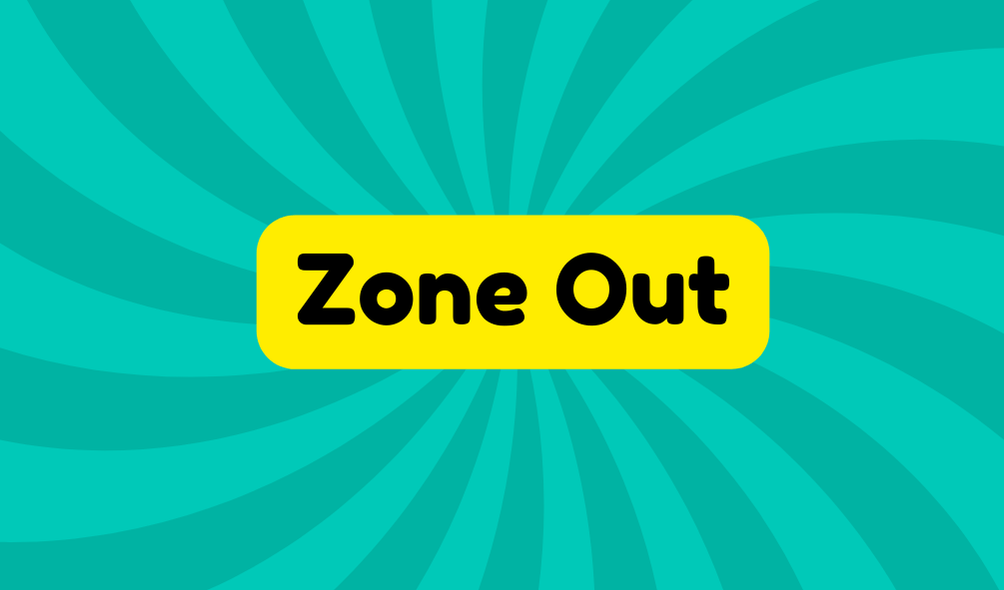"Zone out" means to mentally disengage, often happening during dull lectures or stressful moments. This slang term emerged in the late 20th century, originally linked to drug-induced states but has since evolved to describe everyday distractions. You might find yourself zoning out while binge-watching TV or waiting in line. Common phrases include "zoning out in meetings" or "losing focus while studying." In today's fast-paced world, where distractions are everywhere, recognizing this behavior is vital for improving focus and managing stress. If you're curious about the implications and strategies to address zoning out, there's more to uncover.
Synonyms
When you're feeling overwhelmed or just need a mental break, you might find yourself "zoning out," but there are plenty of synonyms that capture this state. Understanding these alternatives can help you address your need for escapism techniques and mental disengagement more meaningfully. Here are some synonyms to contemplate:
- Spacing out
- Daydreaming
- Checking out
- Losing focus
- Drifting away
Each term highlights a different aspect of detachment, whether you're embracing a moment of quick relaxation or getting lost in thought. Acknowledging these nuances can encourage you to be intentional about your breaks. Rather than simply zoning out, you can choose a deliberate method to enhance your creative thinking or recharge—leading to a more fulfilling mental experience.
Example of Sentences
Zoning out can happen to anyone and often occurs in various situations. You're not alone when your mind drifts during mundane tasks or stressful moments. Here are some relatable scenarios:
- You try to focus in class, but your thoughts wander.
- You zone out while waiting in a long line, counting down the minutes.
- After a long day, binge-watching your favorite series seems irresistible; you just want a mental break.
- During a meeting, someone drones on, and suddenly you look blank.
- You practice various zoning techniques to cope with the overload of daily demands.
Recognizing these instances can help you implement more effective mental breaks, allowing you to regain focus and not just float through life.
Origin
The phrase "zone out" originated in the second half of the 1900s, initially serving as slang for individuals who were drugged or intoxicated. Its historical context reflects a society grappling with substances and their effects. Over time, the term underwent significant linguistic evolution; it shifted from describing a state of inebriation to signifying unintentional distraction or mental disengagement. This change highlights how language adapts to cultural needs. You might notice a possible connection to the 1970s phrase "lost in the ozone," suggesting that disconnect from reality has deep roots. While it may seem harmless today, consider how often we seek to escape rather than confront our challenges—this evolution reveals more about our societal attitudes than we might think.
Collocations
Collocations related to "zone out" help clarify how the term is used in various contexts. You might notice how it connects to emotions and situations, revealing diverse zoning variations. Here are some common collocations that illustrate this:
- zone out during a meeting
- frequently zone out while studying
- zoning out as a mental escape
- zone out when stressed
- often find yourself zoning out in traffic
These phrases highlight how "zone out" can represent different forms of distraction or mental fatigue. It's essential to recognize that while zoning out can offer temporary relief, it may also signify a deeper issue—like the need for a more sustainable mental break rather than just a momentary escape from reality.
How to Use in Everyday Language
Using "zone out" in everyday language is simple and effective when talking about distractions or mental breaks. You can mention zoning out during a long meeting or while scrolling through social media. It's also useful to discuss zoning techniques, like taking short breaks to improve focus. Instead of feeling guilty about zoning out, recognize it as a natural response to mental fatigue. Incorporating mindfulness practices, like deep breathing, can help you stay engaged and reduce the urge to zone out. Remember, while zoning out might feel like a necessary escape, finding balance is key. Using "zone out" reflects our busy lives, but being intentional with your attention can lead to better mental well-being.
Why Is It Still Relevant Today?
In today's fast-paced world, zoning out remains highly relevant as people grapple with constant distractions and mental fatigue. With the impact of technology on attention, it's no wonder you find yourself tuning out during important tasks, overwhelmed by notifications and information overload. This phenomenon reflects a struggle many face in maintaining focus midst relentless stimuli. But it also highlights the need for mindfulness practices for modern life. Practicing mindfulness can anchor you, allowing for deep concentration in an increasingly chaotic environment. By acknowledging zoning out as a coping mechanism, you can begin to navigate your attention challenges more effectively. Embracing these tools can offer a path to reclaim your focus and energy in this innovative, yet demanding, world.







